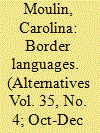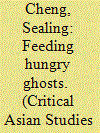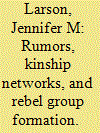|
|
|
Sort Order |
|
|
|
Items / Page
|
|
|
|
|
|
|
| Srl | Item |
| 1 |
ID:
102775


|
|
|
| 2 |
ID:
188574


|
|
|
|
|
| Summary/Abstract |
Following a particularly violent police operation inside the Prince Edward subway station on August 31 2019, during the anti-extradition movement in Hong Kong, a group of older women performed mourning rituals for the possibly dead outside the subway exit for almost one hundred days. In view of increasing police surveillance, violence, and arrests, these women’s religious practices and the sociality they generated constituted a form of infrapolitics. By carefully performing their gendered roles as funerary experts, these women created a makeshift shrine that operated symbolically as a public sphere of dissent. This paper examines the making of their shrine in the context of widespread public discontent about police brutality, and by extension, state violence in a broader political-economic context. Without knowing who was being memorialized, the continuous flow of mourners to the Prince Edward Station shrine compels scholars to consider what these possible deaths could mean and what other losses they were accounting for. Through the lens of infrapolitics, these women’s creative appropriation of mourning rituals directs our attention to the amebic vitality of resistance and its persistence against great odds.
|
|
|
|
|
|
|
|
|
|
|
|
|
|
|
|
| 3 |
ID:
162516


|
|
|
|
|
| Summary/Abstract |
While rumors predominate in conflict settings, researchers have not identified whether and why they influence the start of organized armed conflict. In this paper, we advance a new conceptualization of initial rebel group formation that aims to do so. We present a simple game-theoretic network model to show why the structure of trusted communication networks among civilians where rebel groups form—which carry credible rumors about the rebels—can influence whether incipient rebels become viable. We argue further that in rural Sub-Saharan Africa, kinship network structures favorable to nascent rebels often underlie ethnically homogeneous localities, but not heterogeneous ones. In doing so, we advance a new explanation for why ethnicity influences conflict onset, and show why ethnic grievances may not be a necessary condition for the emergence of “ethnic rebellion.” We illustrate our arguments using new evidence from Uganda that provides a rare window into rebel group formation.
|
|
|
|
|
|
|
|
|
|
|
|
|
|
|
|
| 4 |
ID:
094702


|
|
|
|
|
| Publication |
2010.
|
| Summary/Abstract |
How should researchers treat questions of veracity when conducting interviews in settings rent by large-scale violence, such as war and genocide? To what extent should researchers trust narratives that are generated in politically sensitive contexts? The article argues that the value of narrative data does not lie solely in their truthfulness or accuracy; it also lies in the meta-data that accompany these testimonies. Meta-data are informants' spoken and unspoken thoughts and feelings which they do not always articulate in their stories or interview responses, but which emerge in other ways. This article identifies and analyzes five types of meta-data: rumors, inventions, denials, evasions, and silences. The article argues that meta-data are not extraneous to our datasets, they are data and should be viewed as integral to the processes of data collection and analysis. Meta-data indicate how conditions in the present shape what people are willing to say about violence in the past, what they have reason to embellish or minimize, and what they prefer to keep to themselves. Attending to meta-data is important for responding to informants' fears about talking to a researcher and to ensure informants' safety after the researcher leaves the field. It is also crucial for the robustness of researchers' theories and knowledge about political violence and other political phenomena. The article draws from the author's nine months of fieldwork in Rwanda in 2004, as well as the literature on conflict and violence from political science, anthropology, history, and sociology.
|
|
|
|
|
|
|
|
|
|
|
|
|
|
|
|
|
|
|
|
|